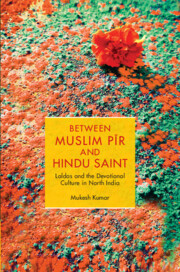Book contents
- Frontmatter
- Dedication
- Contents
- List of Figures, Maps and Tables
- Acknowledgements
- List of Abbreviations
- A Note on Transliteration
- Maps
- 1 The Spectre of Binaries
- 2 Laldas and Religious Duality of Pīr and Sant
- 3 The Laldas Shrines and Inter-religious Disputes
- 4 A Fait Accompli: The Complete Hinduisation of the Laldas Order
- 5 Religious Reform and Shared Shrines
- 6 Concealment and Secrecy: Hidden in Plain Sight
- 7 Poetic Response to Religious Puritanism
- 8 An Ephemeral Line in the Sand
- Appendices
- Glossary
- Bibliography
- Index
7 - Poetic Response to Religious Puritanism
Published online by Cambridge University Press: 30 April 2024
- Frontmatter
- Dedication
- Contents
- List of Figures, Maps and Tables
- Acknowledgements
- List of Abbreviations
- A Note on Transliteration
- Maps
- 1 The Spectre of Binaries
- 2 Laldas and Religious Duality of Pīr and Sant
- 3 The Laldas Shrines and Inter-religious Disputes
- 4 A Fait Accompli: The Complete Hinduisation of the Laldas Order
- 5 Religious Reform and Shared Shrines
- 6 Concealment and Secrecy: Hidden in Plain Sight
- 7 Poetic Response to Religious Puritanism
- 8 An Ephemeral Line in the Sand
- Appendices
- Glossary
- Bibliography
- Index
Summary
Where there is power, there is resistance.
(Foucault 1978a: 95–96)At the Sherpur shrine of Laldas, I was introduced to Jogi and Mirasi bards during a religious performance. These bards were traditionally supported by the Meos under the jajmānī (patron–client) system, which gave the dominant Meos control over these socially and economically marginal Muslim communities. The landless and small landowner bards were hit most by the slow collapse of this patronage system. Additionally, the rise and popularity of the Tablighi Jamaat led most Meos to condemn their musical performances as perversion from Islam, which had once been greatly admired by them. Since the Tablighi doctrine frowns upon music, most Meos today see the bards’ performances as incompatible with Islam. Consequently, the Jogis and Mirasis felt pressured to abandon their performances, even though this was their livelihood, and they cherished their artistry.
As socially and economically marginalised communities, the Jogis and Mirasis had to negotiate the opinions and stances of their erstwhile patrons, whose hostility to their performance now threatens their everyday survival. The Jogi and Mirasi minstrels are employing the lyrics of their new poetic songs as a form of passive resistance in response to the Meo patrons’ interpretation of religious piety. More specifically, these minstrels are promoting a version of righteous behaviour that is universal and does not depend on organised religions.
Earlier, it was noted that when Muslim devotees of saints faced pressure, they resorted to tactics such as secrecy and concealment in order to deal with the Tablighi idea of religious discipline. The examples in Chapter 6 were not related to issues of livelihood but rather to the right to freely profess one's religious beliefs in saints. It was evident that the attempted imposition of the religious authority of the Tablighi Jamaat had severe consequences for many individuals beyond Sufi believers. This same theme is now being explored in relation to Muslim bards and their passive resistance against their former patrons, the Meos. The Meos frequently encouraged the bards to abandon their musical profession, join the Tablighi Jamaat and adopt its reformist principles. Considering the Indic theme of cultural interaction in the formation of all these communities, it is important to analyse the past and present forms of their interrelations and the nature of their religious subjectivity.
- Type
- Chapter
- Information
- Between Muslim Pīr and Hindu SaintLaldas and the Devotional Culture in North India, pp. 187 - 217Publisher: Cambridge University PressPrint publication year: 2024
- Creative Commons
- This content is Open Access and distributed under the terms of the Creative Commons Attribution licence CC-BY-NC 4.0 https://creativecommons.org/cclicenses/

